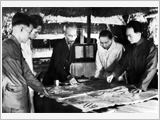
Vietnam’s military art and the requirements for its development in the new situation
Tuesday, July 30, 2024, 10:15 (GMT+7)
It must be affirmed that Vietnam’s military art is the one of the Vietnamese people’s war, combining traditional and modern elements. Vietnam’s military art emerged and gradually developed through the thousands of years of the nation’s struggle to build and safeguard the country.

The art of organising forces and battles in the resistance war against the Song invaders in 981
Friday, May 21, 2021, 09:14 (GMT+7)
Taking advantage of the murder of the King Dinh Tien Hoang and his son Dinh Lien, the Song dynasty decided to invade Dai Co Viet. In order to realise this plot, the Song dynasty mobilised generals and soldiers, formed armies, appointed Hou Renbao as commander of the advance force, Yang Wenjie as commander of the ground force and Liu Cheng as commander of the navy

“Wait at leisure when the enemy labour” - Tran Dynasty’s stratagem in the 3rd Mongol Invasion (1288)
Wednesday, June 24, 2020, 08:15 (GMT+7)
Under the leadership of Tran Quoc Tuan and the General Command, Tran Dynasty’s military forces and people were able to gain a complete victory against the 3rd Mongol Invasion (1288), effectively destroying the enemy’s ambition of conquering Great Viet. This victory was achieved thanks to many factors, including the flexible and creative use of the stratagem “Wait at leisure when the enemy labour”

The art of establishing combat posture in the Northeastern coastal region of Vietnam’s feudal dynasties
Tuesday, September 24, 2019, 06:40 (GMT+7)
The establishment of plantations and installations in the coastal areas is one way to combine military operations with economic development which is a prime policy of feudal dynasties in the construction and protection of the country.

The art of establishing the posture in the battle of Bach Dang 938
Tuesday, June 19, 2018, 16:37 (GMT+7)
1,080 years ago, responding to the request for reinforcements by traitor Kieu Cong Tien, Southern Han dynasty launched an invasion of our country again in 938. Learning from their previous failure (930-931), they made elaborate preparations ranging from force, food to method of combat. To quickly conquer Dai Viet, they organized 2 arms in the two directions

Waterborne warfare - a key characteristic of our resistance wars against the Mongol-ruled Yuan Dynasty
Tuesday, March 27, 2018, 08:54 (GMT+7)
Resistance wars waged by the soldiers and people of Dai Viet against the Mongol-ruled Yuan Dynasty in 1258, 1285 and 1288 serve as an epic in the history of our Homeland defense. They, which have contributed to the country’s fully-fledged military art, are partly characterized by waterborne warfare